DOHA – The Second World Summit for Social Development concluded in Qatar on 6 November 2025, with world leaders, policymakers, and civil society representatives pledging renewed action to advance social justice and sustainable development.
Held at the Qatar National Convention Centre, the summit marked the 30th anniversary of the landmark 1995 Copenhagen Summit, which produced the Copenhagen Declaration and Programme of Action.
Building on those commitments, the Doha gathering focused on accelerating progress in poverty eradication, full employment, decent work, and social inclusion.
More than 8,000 participants attended, including heads of state, UN officials, youth leaders, and private sector representatives.
The event was seen as a pivotal moment to reaffirm the global social contract and address persistent inequalities in an increasingly interconnected world.
At the closing session, delegates adopted the Doha Political Declaration, which emphasised the need to integrate social development goals into broader economic and environmental strategies.
The declaration highlighted that eradicating poverty, ensuring decent work opportunities, and promoting inclusion are essential for achieving sustainable development.
In her address, Annalena Baerbock, President of the 80th Session of the UN General Assembly, described the Summit as “a new beginning for advancing social development globally,” stressing that the outcomes would provide momentum for the 2030 Agenda for Sustainable Development.
Qatar’s Permanent Representative to the UN, Sheikha Alya bint Saif Al Thani, underscored the country’s role in hosting the Summit, noting that Doha had become a hub for international dialogue on social justice and sustainable growth.
UN Secretary-General António Guterres also welcomed the Summit’s achievements, urging member states to translate commitments into concrete policies. “This is an opportunity to renew trust, strengthen partnerships, and ensure that no one is left behind,” he said.
Observers noted that the Summit’s outcomes were widely praised for linking social development with climate resilience, digital inclusion, and equitable economic growth.
Analysts believe the Doha Declaration will serve as a guiding framework for governments and international organisations in the coming decade.
Trending discussions about the Summit include “Doha Political Declaration,” “poverty eradication UN Summit,” and “2030 Agenda social inclusion.”
The event is expected to influence upcoming UN deliberations and regional development strategies, particularly in the Middle East and Global South.
Sources: UN News, UN DESA, Qatar CPD





